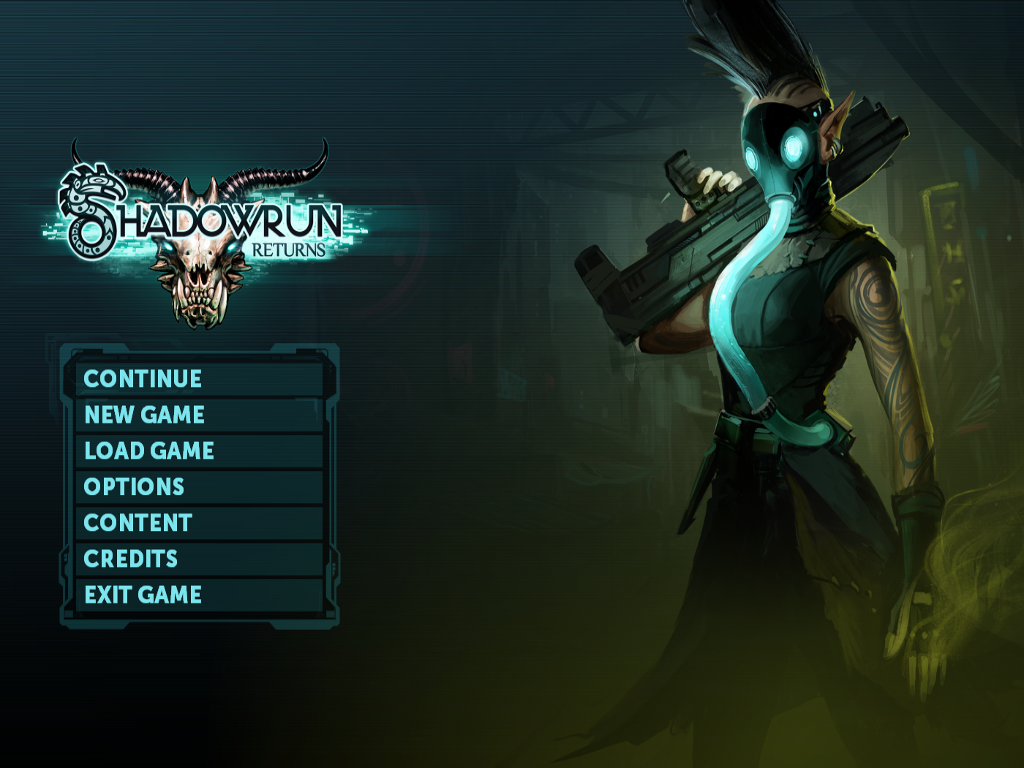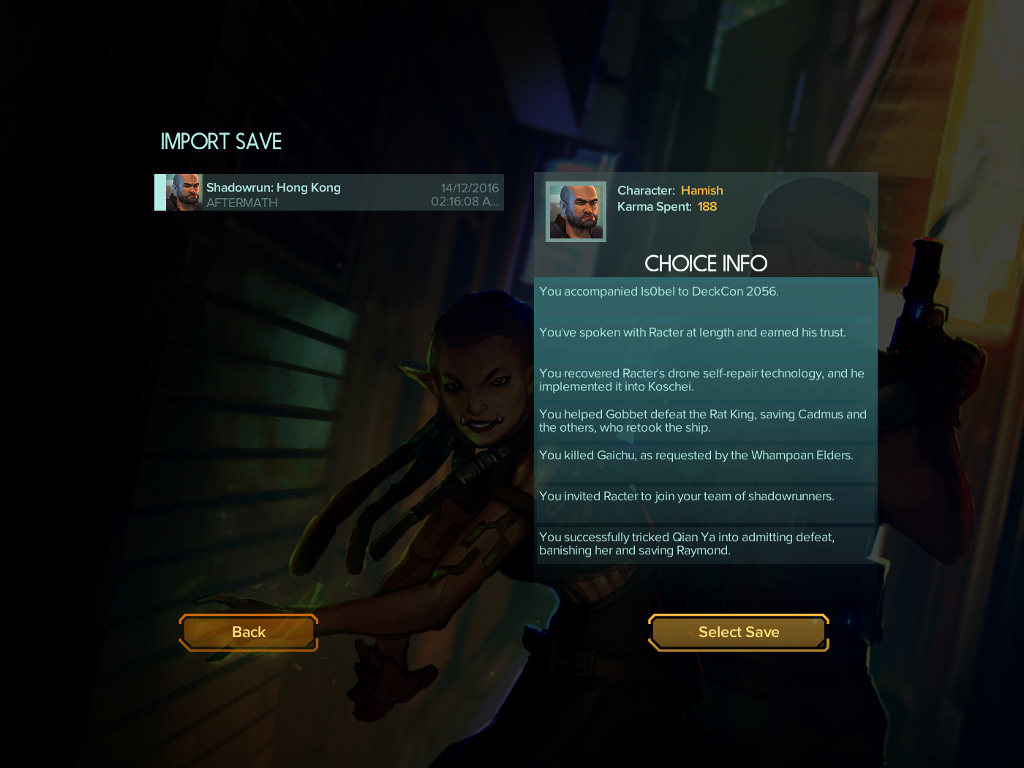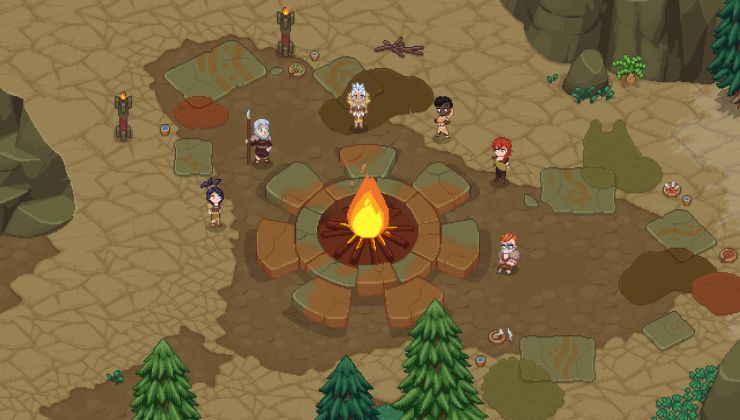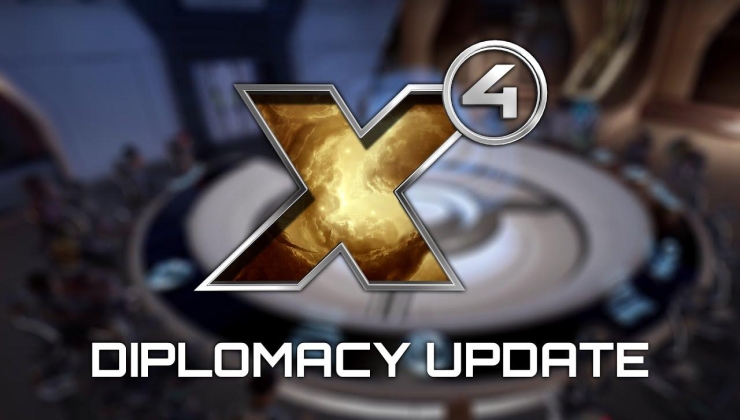Weblinks: Official Website, Steam, GOG.com
Throughout my life I have had several dalliances with CRPGs but rarely found any that I could settle with. I admired the artistry and depth found in Spiderweb Software and Basilisk Games titles, but I was never able to get engrossed in any of them. Dungeons of Dredmor wormed its way into my heart, but I have yet to be as enchanted by another roguelike. I was able to grind through more action oriented variants such as Torchlight, but they always left me feeling burnt out and cold.
I wanted to find at least one larger role-playing series I could get down with, and it was with this in mind that I purchased Shadowrun Returns in September of 2015. It then sat in my back catalogue for over a year. First funded on Kickstarter in 2012, Shadowrun was one of the more high profile titles to be sold on GOG.com as part of their initial Linux offerings. Having some time free after my seasonal bee job and being in desperate need to unwind, I decided to give the game a try.
Shadowrun Returns is a successor of sorts to a couple of RPGs released for 16-bit consoles, which were themselves based on the original Shadowrun tabletop games that first came out in the late 1980s. As such it is set in an already well defined universe with cyberpunk that is so William Gibson that BBS remains popular right into the 2050s. The premise is built around an event known as “The Awakening” wherein magic returned to a world already deviated from our own by advanced technology.
Rather than focusing too heavily on this setting though, all of the Shadowrun games instead try to explore the very personal stories of a group of people called Shadowrunners, mercenaries doing their best to navigate the chaos by taking on the sort of odd jobs that others shy from. It is in this that Shadowrun can stand out, as by having you get involved in the intimate details of its settings and characters a deeper connection is formed than if you were simply playing as an amoral operator.
I decided early on to make a conscious effort to be the "good guy" in any given situation, often taking the more challenging route if I thought it would give me the happier outcome. It is this kind of discipline that an effective role-playing experience thrives on, as by setting rules for myself it gave the game narrative something coherent to latch onto. By sticking to a certain path additional branches opened up, which resulted in a more satisfying ending for the main campaign.
This same strategy also saw me through the two followup games Shadowrun: Dragonfall and Shadowrun: Hong Kong, both of which were released as additional standalone titles featuring unique content. Gameplay consists of conventional skills levelling as well as turn-based tactical encounters, having you take control of a selected team of Shadowrunners against an assortment of enemy units which vary based on the mission you are performing.
Three essential archetypes exist for character creation. Street Samurai and Physical Adepts bear the brunt of combat, Mages and Shamans provide magical support, while Riggers and Deckers control drones and jack into the Matrix respectively. The Matrix is an abstract representation of computer networks, which are again navigated through tactical turn-based combat, although in Hong Kong there is an added puzzle element, even if it does mostly just consist of a game of Simon.
I played as essentially the same Street Samurai character in each game, but no matter what you choose you will still need to create a balanced team containing at least one of each archetype before starting a mission. My aversion to decking, for instance, caused me to be unable to perform certain tasks with desirable ends on certain missions, although the game will force your hand if a certain character class is needed in order to advance the game.
Narrative is relayed to the player through the use of extensive dialogue trees and long streams of text, while the game world itself is made up of hand painted backdrops overlaid with 3D objects and characters. The result is a far more thoughtful experience than what at first might be anticipated, with your own imagination still being called upon to fill in the gaps left by this minimalist approach, something that also helps bring the games that much closer to their tabletop roots.
In “Dead Man’s Switch”, the main campaign of Shadowrun Returns, the story takes the form of a noir detective mystery, while in “Dragonfall” the struggles of a team of Shadowrunners are chronicled living in the Kreusbazar of anarchist flux state Berlin. All three of the games explore class and racial divides through the eyes of their magically segregated characters, using them as convenient analogues for real world political conflicts and prejudices.
“Hong Kong” is by far the murkiest campaign, both in terms of writing and tone, and it may be for this reason that it was my least favourite. There is very limited room for growth when you are working for a cruel crime lord, and I also could not help but notice the amount of copy editing mistakes increased sharply with this release. After playing all three games in a row though, I am sure that some of my coldness here could just be ascribed to player fatigue.
Still, the fact remains that Shadowrun was not only the first CRPG series I found compelling enough to play through all the way to the end, but one that I also found myself invested in enough to purchase additional instalments soon after playing the first. With this experience under my belt I might finally be able to dive into a genre which has always existed on the periphery for me without any real accessible point of entry. Shadowrun gave me that, and for that I am grateful.
Hong Kong has nice "sandboxish" ideas, but too much borinq texts. Even if i only went to the end of DMS campaign, Dragonfall is the best one for me. I could never push myself enough to play all along the stories, but it feels overall the most balanced of all, between texts, combat, story, choices, openworld feeling...
The games are very often on sale, buy them without hesitation if you speak english very well.
Also, SR:D has much better gradation connecting old mythology with corp hunting and so on. HK has a bit worse gradation and story doesn't work as united storyline, but more as two individual ones, only loosely connected.
However, I would not call SR "cRPG". It plays more like tactical TB squad based game with heavy on the story aspects and a lot of moral gray areas. Although I might be just RPG purist hating too much combat in p'n'p RPGs and RPGs in general and preferring "living" as PC, then all those an hour long combats with daily and encounter powers as you might see in DnD.
Still, SR is really linear, it is most obvious on SR:R, which does not offer you much choice and options for cyberware are a bit limited as well. In SR:D, it is much better, although the choice is limited to mission order, but it has much wider choice of cyberware and a lot of missions can be completed (or various objectives inside missions) with good skillcheck. HK added even more interesting cyberware and spells, as well as more weapons, which you will appreciate namely as an adept.
Nice writing Liam, took me a while to read it through ;)
I liked the first game because of the setting and the very good Italian translation, then bought the second episode, but the lack of translation stopped me to play it (there's a lot of text).As an English native speaker one is often unaware of just how easy it can be for us to pick up a game and expect it to work in our language. Being reminded of this more can only be a good thing for developers.
One of the reasons why I stopped playing back then was because you couldn't do manual saves, only autosaves on transitions, which caused too much replaying.With the more recent versions I was playing you can quicksave any time you are not committing an action.
However, I would not call SR "cRPG". It plays more like tactical TB squad based game with heavy on the story aspects and a lot of moral gray areas. Although I might be just RPG purist hating too much combat in p'n'p RPGs and RPGs in general and preferring "living" as PC, then all those an hour long combats with daily and encounter powers as you might see in DnD.I am more than happy to engage in some semantic pedantry myself. ;)
Nice writing Liam, took me a while to read it through ;)See Liam, you inspire so much love here that you get praised even in articles you were not involved with. :P
SR:HK has much more text than SR:D, which some people dislike, but also some people said that SR:HK has much better characters, like one of the best examples of good portrayal of gay character in game.I am not sure I caught that, unless you are referring to the backstory for Glory in Drangonfall instead?
Nice writing Liam, took me a while to read it through ;)
This article is from Hamish, I think.
Loved the Shadowrun series - the first got me back into the whole cRPG/tactical thing. I finished it, went to Wasteland 2, then waited for a crazy long time before coming (last month!) to play and finish Dragonfall. Superb.
On the strength of Dragonfall (MUCH more interesting storywise than the original), I've just bought Hong Kong.
I haven't played the first one yet because reviews mostly said you can skip that one and user reviews were lukewarm. I might give it a shot when I pick it up for cheap one day.
Despite this I have a feeling I will not be too disappointed when I'm through. The game might not end up getting the "Favourite" label on GOG from me, but thus far I don't regret going ahead and buying Hong Kong as well. There's more text in HK you say? Awesome. So far I'm definitely enjoying the story and the atmosphere more than the IMHO slightly tedious fighting.
If someone could take Shadowrun and use something like the Creation Engine and make it an awesome non-linear sprawl like Skyrim with mod support and make it work on Linux then I'd call that the greatest Shadowrun game ever. but I'm not going to hold my breath :P
Last edited by neowiz73 on 23 Jan 2017 at 9:46 pm UTC
I liked the first game because of the setting and the very good Italian translation, then bought the second episode, but the lack of translation stopped me to play it (there's a lot of text).As an English native speaker one is often unaware of just how easy it can be for us to pick up a game and expect it to work in our language. Being reminded of this more can only be a good thing for developers.
Playing RPGs and Adventure Games in a foreign language that you aren't very proficient is very hard: a lot is lost in translation.
I have to admit that while I was playing the first Shadowrun, despite its evidents flaws, I asked myself why I continued: it was because of the very very good Italian translation. It was really fantastic, and managed to create that atmosphere that is fundamental for a RPG or Adventure game.
It's 2017, and developers should understand that they could at least provide subtitles or a way to let users create amateur translations. As an example: we have now a fantastic Italian translation for Baldur's Gate: Enchanced Edition that is included in the original game, at no cost for the developer, thanks to the efforts of the community!
And yes: I don't buy anymore games that at least don't offer subtitles in my native language.
I am not sure I caught that, unless you are referring to the backstory for Glory in Drangonfall instead?
Nope, SPOILERS ... Duncan ... you need to really start reading into his story, he mention dating girl before and then, if you continue talking with him, you find out that he is gay. It is very subtle, you don't find him screaming it, it does not "define" his character and it is not thrown into your face, as in other games and media it is often done. And it fits and kind of explain his struggle and inability to fit into society when he was young.
Last edited by Colombo on 23 Jan 2017 at 10:39 pm UTC
Nope, SPOILERS ... Duncan ... you need to really start reading into his story, he mention dating girl before and then, if you continue talking with him, you find out that he is gay.
Ah, okay, that makes sense. I guess I just spent too much time chatting it up with Racter about how the future of humanity will be our transition to psychopathic cyborgs instead.
rougelike
Roguelike!!
(sorry, it's my pet hate)
Dragonfall is probably the best, but I like the other two--even the more basic one, Shadowrun Returns. A lot of people damn that one with faint praise, but I actually find it pretty good--although I'd love to back-port some of the other games' more advanced magic and cyberware to it.
I too never had Stupendous Man's problem with saving, by the way.
Also, how is the Android version input wise? Maybe I'll play some fan made content on the go instead






















 How to set, change and reset your SteamOS / Steam Deck desktop sudo password
How to set, change and reset your SteamOS / Steam Deck desktop sudo password How to set up Decky Loader on Steam Deck / SteamOS for easy plugins
How to set up Decky Loader on Steam Deck / SteamOS for easy plugins
See more from me